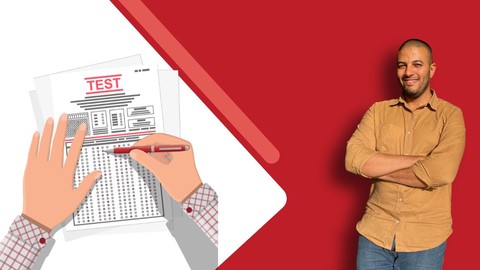
ISTQB Certified Agile Tester
ISTQB Certified Agile Tester, available at $79.99, has an average rating of 4.53, with 60 lectures, 33 quizzes, based on 357 reviews, and has 1267 subscribers.
You will learn about Become a certified ISTQB Agile Tester Understand the 4 values & 12 principles of Agile Differentiate between agile methodologies (Scrum-Kanban-XP) Understand Agile testing methods (TDD-ATDD-BDD) This course is ideal for individuals who are Software Testers or Agile Testers or QA Engineers or Software Engineers or Test Managers It is particularly useful for Software Testers or Agile Testers or QA Engineers or Software Engineers or Test Managers.
Enroll now: ISTQB Certified Agile Tester
Summary
Title: ISTQB Certified Agile Tester
Price: $79.99
Average Rating: 4.53
Number of Lectures: 60
Number of Quizzes: 33
Number of Published Lectures: 60
Number of Published Quizzes: 33
Number of Curriculum Items: 93
Number of Published Curriculum Objects: 93
Original Price: $19.99
Quality Status: approved
Status: Live
What You Will Learn
- Become a certified ISTQB Agile Tester
- Understand the 4 values & 12 principles of Agile
- Differentiate between agile methodologies (Scrum-Kanban-XP)
- Understand Agile testing methods (TDD-ATDD-BDD)
Who Should Attend
- Software Testers
- Agile Testers
- QA Engineers
- Software Engineers
- Test Managers
Target Audiences
- Software Testers
- Agile Testers
- QA Engineers
- Software Engineers
- Test Managers
This course is a complete explanation of the ISTQB Agile Certified Tester Syllabus.
Once you study the whole course you will be ready to apply for the exam.
Each section in the syllabus is explained in a separate video which makes the learning process easier for the trainee.
All course content is updated to the latest version of the syllabus.
Currently in December 2021, this course is the highest-rated ISTQB Agile Tester Course on Udemy platform.
Agile testing is a relatively new approach to software testing that follows the principles of agile software development as outlined in the Agile Manifesto.
A tester on an Agile project will work differently than one working on a traditional project. Testers must understand the values and principles that underpin Agile projects, and how testers are an integral part of a whole-team approach together with developers and business representatives.
There is a lot of confusion concerning agile testing – which means there’s an educational opportunity as well. The Agile Tester will give the tester the knowledge to be part of agile testing teams and achieve high performance.
Business Outcomes
An Agile Tester can…
-
Collaborate in a cross-functional Agile team being familiar with principles and basic practices of Agile software development.
-
Adapt existing testing experience and knowledge to Agile values and principles.
-
Support the Agile team in planning test-related activities.
-
Apply relevant methods and techniques for testing in an Agile project.
-
Assist the Agile team in test automation activities.
-
Assist business stakeholders in defining understandable and testable user stories, scenarios, requirements and acceptance criteria as appropriate.
-
Work and share information with other team members using effective communication styles and channels.
In general, a Certified Tester Foundation Level – Agile Tester is expected to have acquired the necessary skills to working effectively within an Agile team and environment.
Course Curriculum
Chapter 1: Introduction
Lecture 1: Introduction to the Course
Lecture 2: Course Ratings
Lecture 3: Course Prerequisites
Lecture 4: Difference between Agile Tester & Agile Technical Tester
Lecture 5: Exam Structure
Lecture 6: Course Structure
Lecture 7: How to Contact me!
Lecture 8: Let's talk on Slack
Chapter 2: 1.1 The Fundamentals of Agile Software Development
Lecture 1: Agile 4 Values
Lecture 2: Agile 12 Principles
Lecture 3: Whole-Team Approach
Lecture 4: Early & Frequent Feedback
Chapter 3: 1.2 Aspects of Agile Approaches
Lecture 1: Extreme Programming
Lecture 2: Scrum
Lecture 3: Kanban
Lecture 4: Collaborative User Story Creation
Lecture 5: Retrospectives
Lecture 6: Continuous Integration
Lecture 7: Release Planning
Lecture 8: Iteration Planning
Chapter 4: Chapter 1 Sample Exam
Lecture 1: Questions 1 to 5
Lecture 2: Questions 6 to 10
Lecture 3: Questions 11 to 15
Lecture 4: Questions 16 to 20
Lecture 5: Questions 21 to 25
Lecture 6: Questions 26 to 30
Lecture 7: Questions 31 to 35
Lecture 8: Questions 36 to 40
Chapter 5: Chapter 1 Sample Exam
Chapter 6: 2.1 The Differences between Testing in Traditional and Agile Approaches
Lecture 1: Difference between traditional & agile testing
Lecture 2: Agile Work Products
Lecture 3: Test Levels In Agile Projects
Lecture 4: Testing & Configuration Management
Lecture 5: Options for Independent Testing
Chapter 7: 2.2 Status of Testing in Agile Projects
Lecture 1: Status Of Testing In Agile Projects
Lecture 2: Managing Regression Risks
Chapter 8: 2.3 Role and Skills of a Tester in an Agile Team
Lecture 1: Agile Tester Roles & Skills
Chapter 9: Chapter 2 Questions & Answers
Lecture 1: Part 1
Lecture 2: Part 2
Lecture 3: Part 3
Lecture 4: Part 4
Lecture 5: Part 5
Chapter 10: Chapter 2 Sample Exam
Chapter 11: Chapter 3
Lecture 1: Test-Driven Development
Lecture 2: Acceptance Test-Driven Development
Lecture 3: Behavior-Driven Development
Lecture 4: Test Pyramid & Testing Quadrants
Lecture 5: Role of a Tester in an Agile Team
Lecture 6: Assessing Quality Risks
Lecture 7: Planning Poker
Lecture 8: Techniques In Agile Projects
Lecture 9: Definition Of Done (DOD)
Lecture 10: Exploratory Testing In Agile Projects
Lecture 11: Tools In Agile Projects
Chapter 12: Full Syllabus Sample Exam #1
Lecture 1: Questions 1 to 5
Lecture 2: Questions 6 to 10
Lecture 3: Questions 11 to 15
Instructors
-
Tarek Roshdy
QA Engineer -
Nezam Academy
Software & Business Courses -
Nezam Team
Project manager at Nezam
Rating Distribution
- 1 stars: 3 votes
- 2 stars: 3 votes
- 3 stars: 26 votes
- 4 stars: 105 votes
- 5 stars: 220 votes
Frequently Asked Questions
How long do I have access to the course materials?
You can view and review the lecture materials indefinitely, like an on-demand channel.
Can I take my courses with me wherever I go?
Definitely! If you have an internet connection, courses on Udemy are available on any device at any time. If you don’t have an internet connection, some instructors also let their students download course lectures. That’s up to the instructor though, so make sure you get on their good side!
You may also like
- Best Investing Courses to Learn in March 2025
- Best Personal Finance Courses to Learn in March 2025
- Best Health And Wellness Courses to Learn in March 2025
- Best Chatgpt And Ai Tools Courses to Learn in March 2025
- Best Virtual Reality Courses to Learn in March 2025
- Best Augmented Reality Courses to Learn in March 2025
- Best Blockchain Development Courses to Learn in March 2025
- Best Unity Game Development Courses to Learn in March 2025
- Best Artificial Intelligence Courses to Learn in March 2025
- Best Flutter Development Courses to Learn in March 2025
- Best Docker Kubernetes Courses to Learn in March 2025
- Best Business Analytics Courses to Learn in March 2025
- Best Excel Vba Courses to Learn in March 2025
- Best Devops Courses to Learn in March 2025
- Best Angular Courses to Learn in March 2025
- Best Node Js Development Courses to Learn in March 2025
- Best React Js Courses to Learn in March 2025
- Best Cyber Security Courses to Learn in March 2025
- Best Machine Learning Courses to Learn in March 2025
- Best Ethical Hacking Courses to Learn in March 2025
























